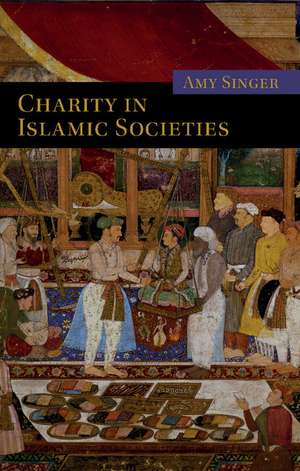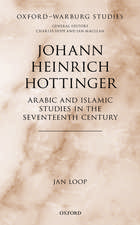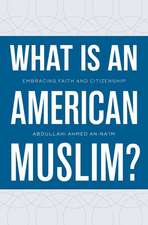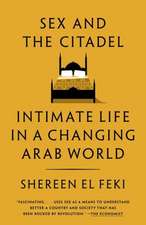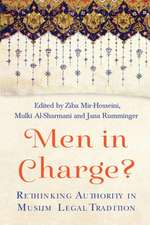Charity in Islamic Societies: Themes in Islamic History
Autor Amy Singeren Limba Engleză Paperback – 17 sep 2008
| Toate formatele și edițiile | Preț | Express |
|---|---|---|
| Paperback (1) | 237.75 lei 6-8 săpt. | |
| Cambridge University Press – 17 sep 2008 | 237.75 lei 6-8 săpt. | |
| Hardback (1) | 554.48 lei 6-8 săpt. | |
| Cambridge University Press – 17 sep 2008 | 554.48 lei 6-8 săpt. |
Preț: 237.75 lei
Nou
Puncte Express: 357
Preț estimativ în valută:
45.51€ • 49.45$ • 38.25£
45.51€ • 49.45$ • 38.25£
Carte tipărită la comandă
Livrare economică 22 aprilie-06 mai
Preluare comenzi: 021 569.72.76
Specificații
ISBN-13: 9780521529129
ISBN-10: 0521529123
Pagini: 260
Ilustrații: 17 b/w illus.
Dimensiuni: 151 x 228 x 17 mm
Greutate: 0.43 kg
Editura: Cambridge University Press
Colecția Cambridge University Press
Seria Themes in Islamic History
Locul publicării:Cambridge, United Kingdom
ISBN-10: 0521529123
Pagini: 260
Ilustrații: 17 b/w illus.
Dimensiuni: 151 x 228 x 17 mm
Greutate: 0.43 kg
Editura: Cambridge University Press
Colecția Cambridge University Press
Seria Themes in Islamic History
Locul publicării:Cambridge, United Kingdom
Cuprins
Introduction; 1. Pray and pay alms; 2. Even half a date; 3. The upper hand; 4. The poor and the needy; 5. The mixed economy of charity; Conclusion: reorienting charity.
Recenzii
'Weaving many anecdotes and personal experiences into her narrative, in addition to careful textual readings, Singer captures the psychological subtleties that characterise nearly all aspects of charitable giving and demonstrates how these have manifested themselves throughout history. As a consequence, her book has a freshness and relevancy that is not always found in scholarly works.' Haaretz, Israeli Daily Newspaper
'Undergraduates should find the book a very useful introduction to an aspect of Islamic societies that is rarely discussed historically. Those who are familiar with the general themes of the book, like zakat (alms) and waqf (religious endowment), will still find its broad and comparative framework very stimulating.' Middle East Journal
'[Singer's] book serves as an effective counterweight to post-9/11 studies that link Islamic charities and jihadist movements. [She] succeeds in decoupling the contemporary association between Islamic charity and violence.' History
'Amy Singer draws on a vast array of sources, from 10th century jurist Abu Hamid Muhammad al-Ghazali to early 20th century Turkish political activist Halide Edip Adavar, in her rich overview of philanthropy in Islamic societies. The work unites religious texts and their meaning with a fascinating analysis of the role and impact of charity in Islamic societies, presenting charity as both religious ideal and social practice.' Alliance
'… this fine book accomplishes what it sets out to do: to present an overview of Islamic charitable practices through an examination of the texts that have underpinned them and the many ways in which those texts have been examined and re-interpreted over the centuries. One anticipates that many of Singer's readers will heed her challenge to take up where this book, and her questions, leaves off.' Lisa Pollard, English Historical Review
'Singer attempts to offer an all-encompassing view of a mammoth topic … Singer recognizes that her text is introductory for both scholars of Islam and scholars specializing in charity. In addition to an introduction and conclusion, the book is divided into five chapters - each engaging a particular theme or facet of charitable giving … The author's objectives are admirable: integrating Islamic societies into general scholarship on charity; countering recent negative representations of Muslim charity; filling a perceived gap in Islamic studies; and, perhaps secondarily, blurring a conceptual line between charity and patronage.' The Journal of Interdisciplinary History
'Amy Singer's comprehensive study of Islamic charity and the institution of Islamic pious and charitable foundations (waqf) is a timely and welcome addition to the state of scholarship on this important institution across time and space. It provides background on the normative definition of charity contained in the Qur'an and hadith and takes up the question of praxis across Muslim societies from medieval to modern times.' Journal of the American Oriental Society
'Undergraduates should find the book a very useful introduction to an aspect of Islamic societies that is rarely discussed historically. Those who are familiar with the general themes of the book, like zakat (alms) and waqf (religious endowment), will still find its broad and comparative framework very stimulating.' Middle East Journal
'[Singer's] book serves as an effective counterweight to post-9/11 studies that link Islamic charities and jihadist movements. [She] succeeds in decoupling the contemporary association between Islamic charity and violence.' History
'Amy Singer draws on a vast array of sources, from 10th century jurist Abu Hamid Muhammad al-Ghazali to early 20th century Turkish political activist Halide Edip Adavar, in her rich overview of philanthropy in Islamic societies. The work unites religious texts and their meaning with a fascinating analysis of the role and impact of charity in Islamic societies, presenting charity as both religious ideal and social practice.' Alliance
'… this fine book accomplishes what it sets out to do: to present an overview of Islamic charitable practices through an examination of the texts that have underpinned them and the many ways in which those texts have been examined and re-interpreted over the centuries. One anticipates that many of Singer's readers will heed her challenge to take up where this book, and her questions, leaves off.' Lisa Pollard, English Historical Review
'Singer attempts to offer an all-encompassing view of a mammoth topic … Singer recognizes that her text is introductory for both scholars of Islam and scholars specializing in charity. In addition to an introduction and conclusion, the book is divided into five chapters - each engaging a particular theme or facet of charitable giving … The author's objectives are admirable: integrating Islamic societies into general scholarship on charity; countering recent negative representations of Muslim charity; filling a perceived gap in Islamic studies; and, perhaps secondarily, blurring a conceptual line between charity and patronage.' The Journal of Interdisciplinary History
'Amy Singer's comprehensive study of Islamic charity and the institution of Islamic pious and charitable foundations (waqf) is a timely and welcome addition to the state of scholarship on this important institution across time and space. It provides background on the normative definition of charity contained in the Qur'an and hadith and takes up the question of praxis across Muslim societies from medieval to modern times.' Journal of the American Oriental Society
Descriere
An in-depth tour of the history of charity in Islamic societies from the beginnings of Islam to the present day.
